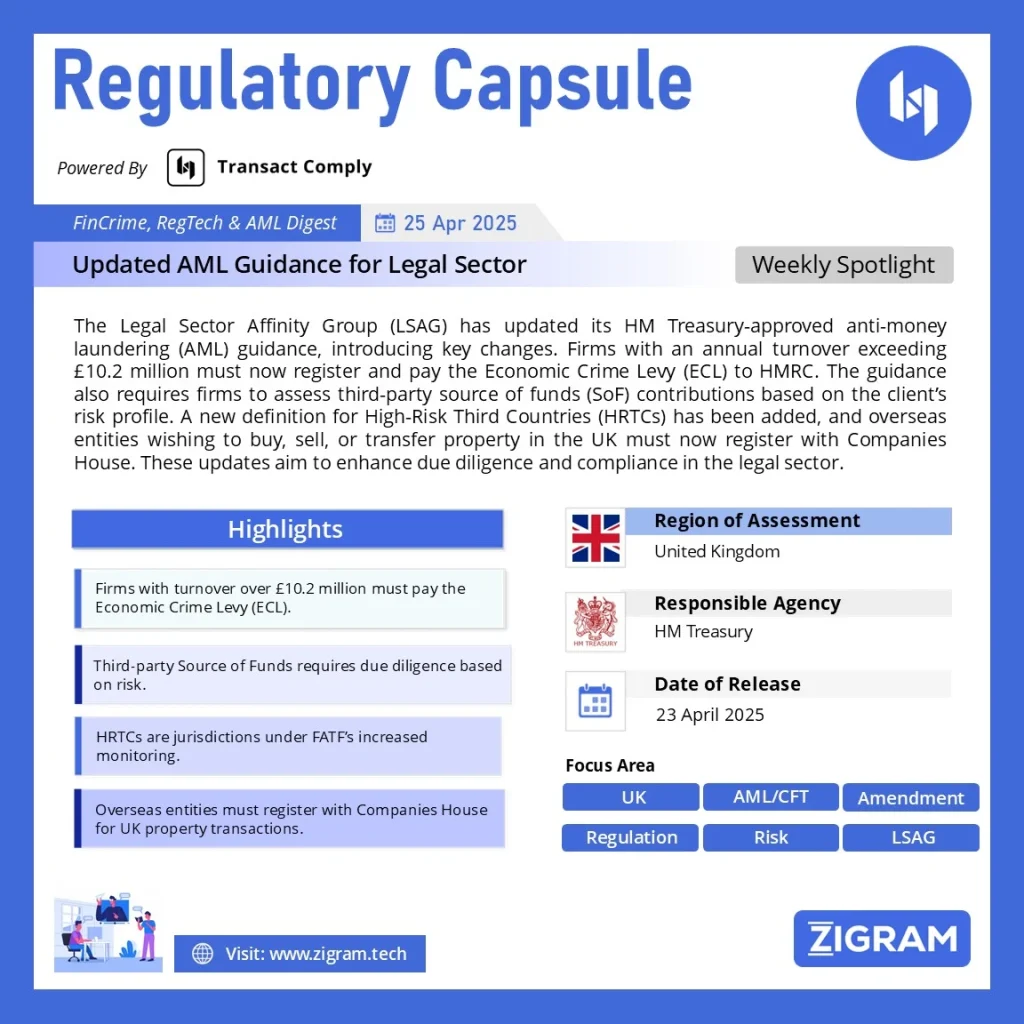Regulation Name: Anti-Money Laundering Guidance for the Legal Sector 2025
Date Of Release: 15 April 2025
Region: United Kingdom
Agency: HM Treasury
Key Updates to HM Treasury-Approved Anti-Money Laundering (AML) Compliance Guidance for the Legal Sector
The Legal Sector Affinity Group (LSAG) has issued updated guidance for legal professionals in the UK regarding anti-money laundering (AML) compliance, bringing new clarity on several important areas that impact firms’ operations. The updates include new requirements related to the Economic Crime Levy (ECL), third-party sources of funds, high-risk third countries, and the registration of overseas entities involved in property transactions in the UK. Below is an overview of the key updates.
Economic Crime Levy (ECL) for Firms with Annual Turnover Above £10.2 Million
Legal firms with an annual turnover exceeding £10.2 million are now required to register and pay the Economic Crime (Anti-Money Laundering) Levy (ECL) to HMRC. The ECL is payable annually as long as the firm’s turnover exceeds the threshold, and it must be paid online. Firms that are dual-regulated by the Financial Conduct Authority (FCA) and a professional body supervisor must register using their FCA credentials. This update aims to strengthen the UK’s efforts in combating economic crime and ensure that the legal sector plays its part in funding the enforcement of anti-money laundering measures.
Updated Guidance on Third-Party Source of Funds Contributions
The LSAG has clarified the expectations surrounding third-party source of funds (SoF) contributions. When a third party is involved in funding a transaction, legal firms are required to not only understand and gather evidence of the client’s own source of funds but also seek to obtain evidence regarding the third party’s underlying source of funds. The extent of these measures will vary depending on the risk level of the client or transaction. The guidance emphasizes that accepting payments from unknown or unassociated third parties is a specific risk factor under regulation 33(6)(b)(iv), and firms must assess and document the need for such checks based on their risk assessments.
High-Risk Third Countries (HRTC) Definition
A new definition for High-Risk Third Countries (HRTCs) has been introduced. Under the updated regulations, HRTCs are now specifically defined as jurisdictions either subject to a Call for Action or under Increased Monitoring by the Financial Action Task Force (FATF). Firms will need to pay special attention to these jurisdictions when conducting due diligence and assessing potential risks in transactions, especially with clients or parties in such jurisdictions.
Register of Overseas Entities for Property Transactions
In a move to further strengthen transparency, the updated guidance requires that overseas entities wishing to buy, sell, or transfer property or land in the UK must now register with Companies House. An overseas entity is defined as any legal entity governed by the laws of a country outside the UK. This requirement applies to property transactions that have occurred since:
• 1 January 1999 in England and Wales
• 8 December 2014 in Scotland
• 5 September 2022 in Northern Ireland
The Register of Overseas Entities (ROE) is not publicly accessible, but interested parties can request copies from Companies House. Legal firms must be cautious in relying solely on the ROE for verification purposes, as discrepancies in the information provided could occur. Regulation 30A, introduced alongside the ROE, mandates discrepancy reporting, highlighting the need for firms to independently verify any information on the register.
Ongoing Risk Assessment and Due Diligence Obligations
The updated guidance reiterates the importance of ongoing risk assessments for legal firms when dealing with clients and transactions. This includes an obligation to demonstrate that due diligence measures are appropriate, based on the risk profile of the client or matter, and in compliance with the firm’s risk assessment and the relevant sectoral risk assessment.
Conclusion
These updates to the AML compliance guidance for the legal sector reflect the UK’s ongoing efforts to tighten the regulatory framework surrounding anti-money laundering and economic crime. Legal firms must be proactive in understanding these new requirements, ensuring they are registered for the Economic Crime Levy, conducting thorough due diligence on third-party sources of funds, and adhering to new rules on overseas entities involved in property transactions. As always, compliance with these regulations is essential to maintaining the integrity of the legal profession and contributing to the broader fight against financial crime.
Read the full guidance here.
Read about the product: Transact Comply
Empower your organization with ZIGRAM’s integrated RegTech solutions – Book a Demo
- #AML
- #AntiMoneyLaundering
- #EconomicCrime
- #LegalSector
- #Compliance
- #LegalIndustry
- #FinancialCrime
- #SourceOfFunds
- #ThirdPartyFunding
- #OverseasEntities
- #UKLaw
- #LSAG
- #HMRC
- #RegulatoryCompliance
- #RiskManagement
- #FATF
- #EconomicCrimeLevy
- #PropertyTransactions
- #Transparency
- #FinancialRegulations
